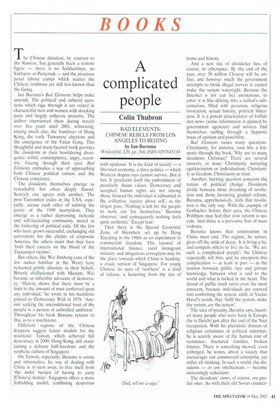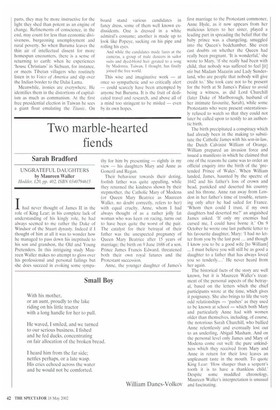A complicated people
Colin Thubron
BAD ELEMENTS: CHINESE REBELS FROM LOS ANGELES TO BEIJING by Ian Buruma Weidenfeld, £20, pp. 368, ISBN 0297643134 The Chinese dissident, by contrast to the Russian, has generally been a remote figure — there is no Solzhenitsyn, no Sakharov or Pasternak — and the atrocious penal labour camps which scatter the Chinese landmass are still less known than the Gulag.
Ian Buruma's Bad Elements helps make amends. The political and cultural questions which rage through it are vested in characterful men and women with shocking pasts and largely unheroic presents. The author interviewed them during travels over five years until 2001, witnessing, among much else, the handover of Hong Kong, the early Taiwanese elections and the emergence of the Falun Gong. This thoughtful and many-faceted book portrays the dissidents in their bewildering divergence: wilful, contemplative, angry, eccentric. Gazing through their eyes, Bad Elements embodies a way of approaching both Chinese political culture and the Chinese conscience.
The dissidents themselves emerge as remarkable but often deeply flawed. Scarcely one agrees with another. The post-Tiananmen exiles in the USA, especially, accuse each other of tainting the purity of the 1989 martyrdom. They emerge as a rather depressing, inchoate and self-lacerating community, mired in the bickering of political exile. Of the few who have grown successful, exchanging old convictions for the clichés of corporate America, the others insist that they have 'built their careers on the blood of the Tiananmen victims'.
But others, like Wei Jinsheng (one of the few names familiar in the West) have remained grimly absolute in their beliefs. Bitterly disillusioned with Maoism, Wei became an inflexible advocate of democracy. 'History shows that there must he a limit to the amount of trust conferred upon any individual,' he wrote in his manifesto pinned to Democracy Wall in 1978. 'Anyone seeking the unconditional trust of the people is a person of unbridled ambition.' Throughout his book Buruma returns to this, as to a touchstone.
Different regions of the Chinese diaspora suggest future models for the mainland: Taiwan, which achieved full democracy in 2000; Hong Kong, still maintaining a delicate half-freedom; and the synthetic culture of Singapore.
On Taiwan, especially, Buruma is astute and informative. Its way of dealing with China is to turn away, to free itself from 'the awful burden of having to carry [China's] destiny', Singapore offers a more forbidding model, combining despotism with opulence. It is the kind of society — a liberated economy, a slave politics — which Western dogma says cannot survive. But it has. It proclaims itself the embodiment of peculiarly Asian values. Democracy and accepted human rights are not among these. Instead the individual is subsumed in the collective: 'society above self', as the slogan goes. 'Nothing is left for the people to work out for themselves,' Buruma observes, 'and consequently nothing feels quite authentic.' Except fear.
Then there is the Special Economic Zone of Shenzhen, set up by Deng Xiaoping in the 1980s as an experiment in commercial freedom. This turmoil of international finance, rural immigrant industry and ubiquitous corruption may be the place towards which China is heading: a crude version of Singapore. For young Chinese its aura of 'nowhere' is a kind of release, a loosening from the ties of home and history.
And a new site of dissidence lies, of course, in cyberspace. By the end of the year, over 30 million Chinese will be online, and however much the government attempts to block illegal servers it cannot make the system watertight. Because the Internet is (or can be) anonymous, to enter it is like delving into a nation's subconscious, filled with paranoia, religious invocation, sexual fantasy, political bitterness. It is a potent disseminator of forbidden news (some information is planted by government agencies) and novices find themselves surfing through a hypnotic maze of opinion and possibility.
Bad Elements raises many questions. Christianity, for instance, runs like a leitmotiv through the book. Why are so many dissidents Christian? There are several answers, or none: Christianity nurturing egalitarianism or individualism, Christianity as freedom, Christianity as trust.
Another, burning question concerns the nature of political change. Dissidents divide between those dreaming of revolution and those favouring gradual reform. Buruma, apprehensively, feels that revolution is the only way. With the example of Gorbachev before their eyes, the Chinese Politburo may feel that slow reform is suicide. And there is a pervasive fear of mass violence.
Buruma knows that communism in China must end. The regime, he senses, gives off the stink of decay. It is living a lie, and compels others to live its lie. 'We are such a complicated people', the Chinese repeatedly tell him, and he interprets this complication — at least in part — as the tension between public face and private knowledge, between what is said to the world and what is locked in the heart. The denial of public truth taints even the most innocent, because individuals are coerced into confirming the system, until, in Vaclav Havel's words, they 'fulfil the system, make the system, are the system'.
The idea of tyranny, Buruma says, haunted many people who were born in Europe (he is Dutch) just after the end of the Nazi occupation. With his pluralistic distrust of religious certainties or political extremes, he is acutely aware of the human cost of resistance: fractured families, broken futures. There is something skewed, even unhinged, he writes, about a society that encourages raw commercial enterprise, yet stifles all thinking. In such a world, the dissidents — or any intellectuals — become increasingly redundant.
The dissidents' views, of course, are partial ones. As with their old Soviet counter parts, they may be more instructive for the light they shed than potent as an engine of change. Refinements of conscience, in the end, may count for less than economic divisiveness, burgeoning unemployment and rural poverty. So when Buruma leaves the thin air of intellectual dissent for more homespun encounters, there is a sense of returning to earth: when he experiences 'house Christians' in Sichuan, for instance, or meets Tibetan villagers who routinely listen in to Voice of America and slip over the Indian border to the Dalai Lama.
Meanwhile, ironies are everywhere. He identifies them in the distortions of capitalism as much as communism. At the first free presidential election in Taiwan he sees a giant float emulating the Titanic. On board stand various candidates in fancy dress, some of them well known exdissidents. One is dressed in a white admiral's costume; another is made up to look like Popeye, sucking on his pipe and rolling his eyes.
And while the candidates made faces at the cameras, a group of male dancers in sailor suits and dyed-blond hair gyrated to a song by Madonna. Taiwan. I thought, has finally joined the free world.
This wise and imaginative work — at once so sympathetic and so critically alert — could scarcely have been attempted by anyone but Buruma. It is the fruit of dedicated travel and research, and above all of a mind too stringent to be misled — even by its own hopes.
first marriage to the Protestant commoner, Anne Hyde, as it now appears from her malicious letters to her sister, played a leading part in spreading the belief that the baby prince was a changeling, smuggled into the Queen's bedchamber. She even cast doubts on whether the Queen had really been pregnant. 'It is wonderful,' she wrote to Mary, 'if she really had been with child, that nobody was suffered to feel [it] stir but Madam Mazarin and Lady Sunderland, who are people that nobody will give credit to.' She took care not to be present for the birth at St James's Palace to avoid being a witness, as did Lord Churchill (later Duke of Marlborough, husband of her intimate favourite, Sarah), while some Protestants who were present ostentatiously refused to watch so that they could not later be called upon to testify to an authentic birth.
The birth precipitated a conspiracy which had already been in the making to substitute the Catholic James with his son-in-law, the Dutch Calvinist William of Orange. William prepared an invasion force and issued a manifesto in which he claimed that one of the reasons he came was to order an official enquiry into the birth of the 'pretended Prince of Wales'. When William landed, James, haunted by the spectre of 1642 and his father's loss of crown and head, panicked and deserted his country and his throne. Anne ran away from London in her father's time of trouble, returning only after he had sailed for France. 'Whom then could I trust, if my own daughters had deserted me?' an anguished James asked. 'If only my enemies had cursed me, I could have borne it.' On 9 October he wrote one last pathetic letter to his favourite daughter, Mary: 'I had no letter from you by the last post ... and though I know you to be a good wife [to William]
I must believe you will still be as good a daughter to a father that has always loved you so tenderly....' He never heard from her again.
The historical facts of the story are well known, but it is Maureen Waller's treatment of the personal aspects of the betrayal, based on the letters which the chief participants wrote at the time, which gives it poignancy. She also brings to life the very odd relationships — `pashes' as they used to be known at school — which both Mary and particularly Anne had with women older than themselves, including, of course, the notorious Sarah Churchill, who bullied Anne relentlessly and eventually lost out to an underling, Abigail Masham. And on the personal level only James and Mary of Modena come out well: the pure unkindness which they received from Mary and Anne in return for their love leaves an unpleasant taste in the mouth. To quote King Lear: 'How sharper than a serpent's tooth it is to have a thankless child.Despite some muddled chronology, Maureen Waller's interpretation is unusual and fascinating.















































































 Previous page
Previous page